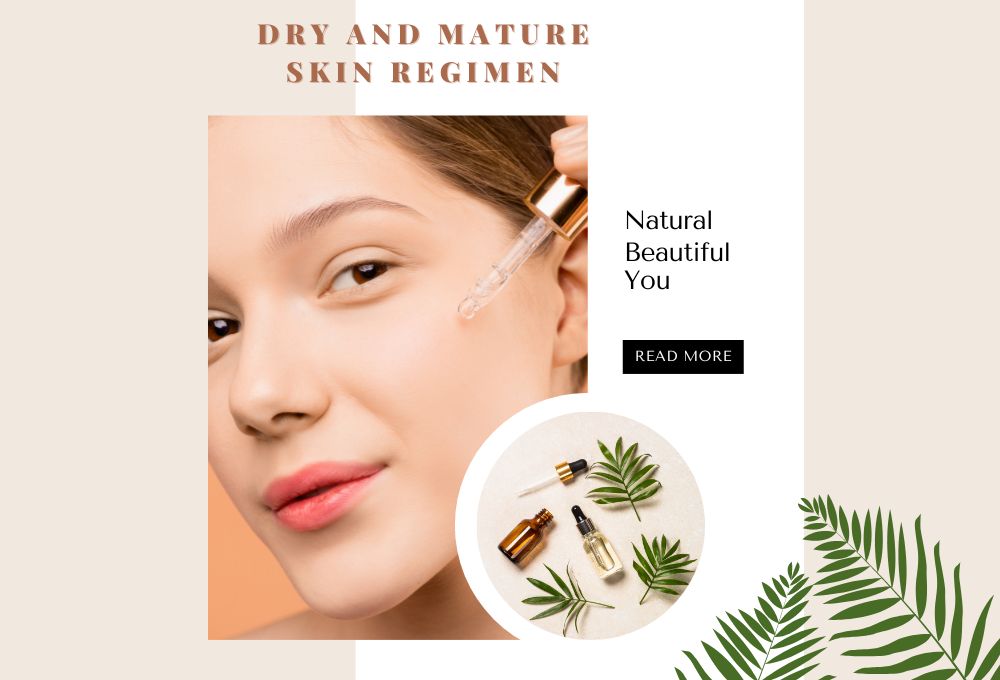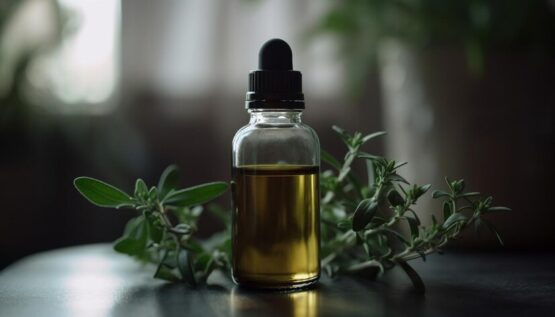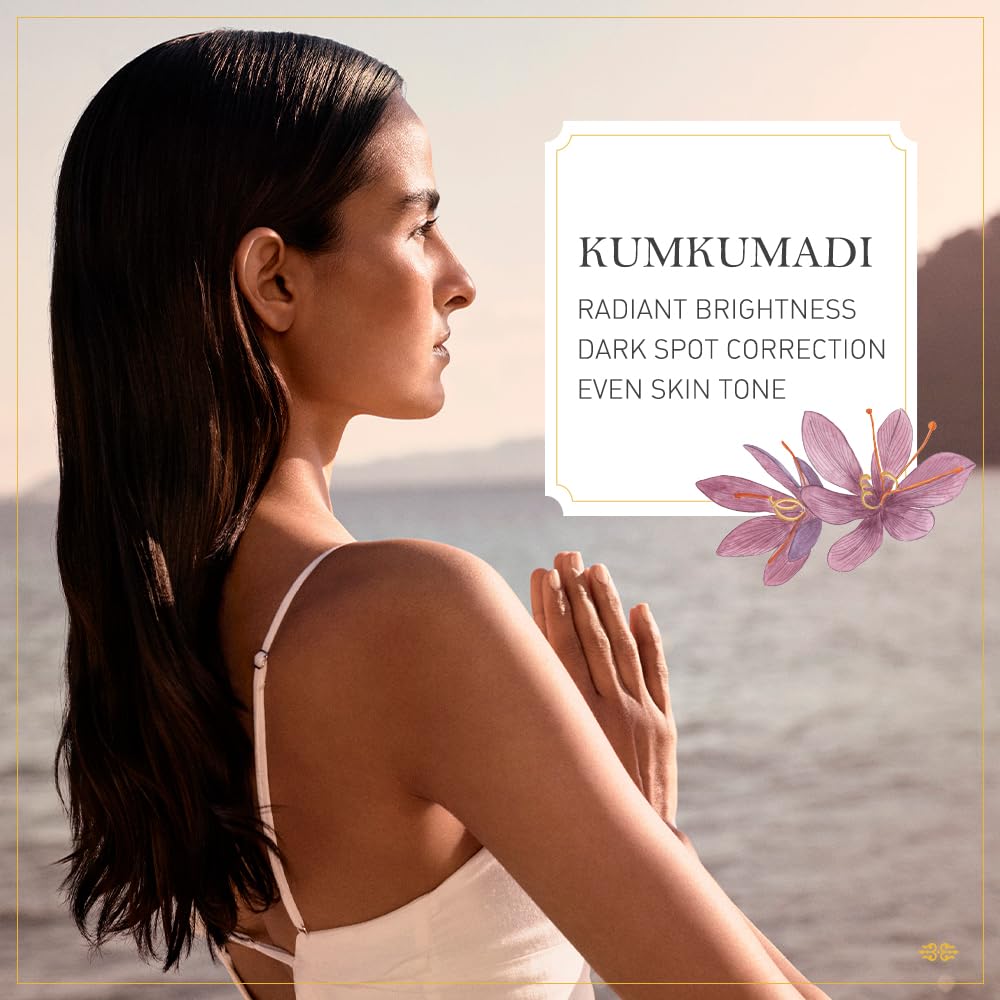Dry and Mature Skin Regimen Welcome to your ultimate guide to achieving a radiant glow at any age. Dry and mature skin can present unique challenges, but fear not – we’ve got you covered with a comprehensive regimen tailored to address your specific needs.
Understanding Dry and Mature Skin
In skin care, understanding your skin type is crucial for crafting an effective routine. Two common concerns that individuals often grapple with are dry skin and mature skin. In this comprehensive guide, we’ll delve into the intricacies of both skin types, offering insights into their unique characteristics and providing valuable tips for optimal care.
Unveiling the Characteristics of Dry Skin
- Dry skin is more than just a cosmetic woe; it’s a condition that requires thoughtful attention. Dry skin is often characterized by a lack of moisture, resulting in a tight and sometimes itchy feeling. Individuals with dry skin may notice flakiness, redness, and fine lines, indicating a deficiency in the skin’s natural hydration levels.
Causes of Dry Skin
- Understanding the root causes of dry skin is crucial for devising an effective skincare routine. External factors such as harsh weather, excessive sun exposure, and the use of harsh soaps can strip the skin of its natural oils. Internally, genetics, hormonal changes, and certain medications can contribute to dryness.
Tailoring Your Skincare Routine for Dry Skin
- Crafting a skincare routine tailored to dry skin involves a combination of hydration, protection, and nourishment.
Hydration is Key
- To combat dryness, prioritize hydrating skincare products that include ingredients like hyaluronic acid and glycerin. These components attract and retain moisture, promoting a supple and well-hydrated complexion.
Protective Measures
- Shielding your skin from harsh environmental elements is paramount. Sunscreen with a high SPF is essential to prevent further moisture loss and protect against UV rays, ensuring your skin stays resilient.
Nourishing Treatments
- Incorporate moisturizers with natural oils such as jojoba or almond oil to replenish the skin’s lipid barrier. Additionally, consider indulging in hydrating face masks and serums for an extra boost of moisture.
The Journey into Mature Skin
- As we age, our skin undergoes a natural process of maturation, accompanied by distinct changes in texture and elasticity. Understanding the nuances of mature skin is pivotal for embracing the ageing process with grace.
Identifying Mature Skin Characteristics
- Mature skin is characterized by a decrease in collagen and elastin production, leading to sagging, wrinkles, and a loss of firmness. Uneven skin tone and age spots may also become more prominent.
Embracing Aging Gracefully
- While the ageing process is inevitable, adopting a positive mindset and a tailored skincare routine can make a significant difference. Prioritize products with anti-ageing ingredients like retinol, peptides, and antioxidants to address specific concerns associated with mature skin.
Crafting an Effective Skincare Routine for Mature Skin
- A well-crafted skincare routine can enhance the vitality of mature skin, promoting a radiant and youthful appearance.
Gentle Cleansing
- Opt for a gentle cleanser that removes impurities without stripping the skin of its natural oils. This sets the foundation for the subsequent steps in your routine.
Targeted Treatments
- Incorporate targeted treatments such as retinol serums to stimulate collagen production and reduce the appearance of fine lines and wrinkles. These potent formulations can significantly contribute to skin rejuvenation.
Moisturization and Sun Protection
- Adequate moisturization is non-negotiable for mature skin. Choose rich, nourishing moisturizers to maintain hydration levels. Coupled with regular application of sunscreen, this forms a formidable defence against premature ageing caused by UV rays.
2. Cleansing for Radiance
Gentle Cleansers for Mature Skin
- When it comes to nurturing mature skin, the cleansing step is a crucial foundation for achieving a radiant and youthful glow. Mature skin tends to be drier and more delicate, requiring a gentle touch to cleanse effectively without irritating.
Choosing the Right Cleanser
- Opt for a mild, hydrating cleanser that respects the unique needs of mature skin. Look for formulations that boast ingredients like hyaluronic acid and glycerin. These powerhouse components not only cleanse but also infuse the skin with much-needed moisture, promoting a supple and smooth complexion.
Hyaluronic Acid: The Hydration Hero
- Hyaluronic acid, a naturally occurring substance in the skin, is a standout ingredient in cleansers for mature skin. Known for its exceptional ability to retain moisture, hyaluronic acid ensures that your skin stays hydrated throughout the cleansing process. This is especially vital for combating the dryness often associated with mature skin.
Glycerin’s Nourishing Touch
- Glycerin, a humectant that attracts and retains moisture, is another star player in gentle cleansers. Its hydrating properties help to replenish the skin’s lipid barrier, preventing excessive dryness and leaving your skin feeling comfortably moisturized after each cleanse.
Avoiding Harsh Ingredients
- Steer clear of cleansers that contain harsh ingredients like sulfates and alcohol. These can strip the skin of its natural oils, exacerbating dryness and potentially causing irritation. A mild, sulfate-free cleanser ensures a thorough cleanse without compromising the skin’s delicate balance.
Cleansing Routine: Best Practices
- Morning and Night: Establish a consistent cleansing routine, ideally in the morning and before bedtime, to remove impurities and prepare your skin for subsequent skincare steps.
- Gentle Circular Motions: Apply the cleanser using gentle circular motions, avoiding tugging or pulling on the skin. This promotes blood circulation and ensures effective cleansing without stressing mature skin.
- Pat Dry: After cleansing, pat your skin dry with a soft towel. Avoid rubbing, as this can irritate the skin. Leaving a bit of moisture on the skin before applying the next skincare product helps lock in hydration.
3. Hydration is Key
- In the pursuit of a radiant and youthful complexion, hydration takes centre stage, especially for individuals with dry and mature skin. The key to unlocking that coveted glow lies in a meticulously crafted moisturizing routine designed to replenish and retain essential moisture.
The Significance of Moisturizing
- Dry and mature skin tends to lack the necessary oils and moisture, leading to a dull and dehydrated appearance. Moisturizing is not merely a luxury but a vital step in restoring the skin’s natural barrier, preventing moisture loss, and promoting overall skin health.
Ingredients for Maximum Hydration
- When selecting a moisturizer for mature skin, prioritize products enriched with ingredients that provide intense hydration. Look for:
Shea Butter
- Renowned for its emollient properties, shea butter is a powerhouse ingredient that deeply nourishes and soothes dry skin. It forms a protective barrier, sealing in moisture and promoting a supple and smooth complexion.
Ceramides
- Ceramides are natural lipids that play a crucial role in maintaining the skin’s moisture barrier. Incorporating a moisturizer with ceramides strengthens the skin’s protective layer, preventing water loss and enhancing hydration.
Fatty Acids
- Omega-3 and omega-6 fatty acids are essential for maintaining skin elasticity. Moisturizers containing these fatty acids contribute to a plump and youthful appearance by nourishing the skin from within.
Choosing the Right Moisturizer
- Not all moisturizers are created equal, and selecting the right one for your skin type is paramount. Opt for a rich and hydrating formula tailored to the specific needs of mature skin. Creams or lotions with a thicker consistency are often more effective in providing lasting moisture.
Daily Moisturizing Routine
- Morning Application: Begin your day by applying a generous amount of moisturizer to clean, dry skin. This creates a protective barrier that shields your skin from external aggressors throughout the day.
- Nighttime Ritual: Before bedtime, indulge your skin with a nourishing night cream. Nighttime is an optimal period for your skin to absorb and benefit from the moisturizer’s replenishing properties.
- Targeted Hydration: For an extra boost, consider using a hydrating serum before applying your moisturizer. Serums with hyaluronic acid can attract and retain moisture, enhancing the overall hydrating effect.
4. Targeted Treatments
Serums and Boosters
- Elevating your skincare routine to new heights involves the strategic integration of targeted treatments, with serums and boosters leading the charge. When dealing with the specific concerns of dry and mature skin, these potent formulations become indispensable in the quest for ageless radiance.
Unveiling the Power of Serums
- Serums are concentrated formulations designed to address specific skin concerns. For individuals grappling with the effects of ageing and dryness, incorporating the right serums can make a transformative difference.
Retinol: The Anti-Aging Maverick
- Retinol, a derivative of vitamin A, stands out as a powerhouse ingredient in anti-ageing serums. Known for its ability to stimulate collagen production, retinol helps reduce the appearance of fine lines and wrinkles, promoting a smoother and more youthful complexion.
Peptides: Building Blocks of Youthful Skin
- Peptides, tiny protein molecules, play a vital role in maintaining skin elasticity. Serums infused with peptides contribute to the regeneration of collagen, providing firmness and resilience to ageing skin.
Hyaluronic Acid: The Hydration Booster
- Hyaluronic acid, a hydration maestro, is not limited to cleansers. Serums featuring this wonder ingredient excel in attracting and retaining moisture, plumping the skin and diminishing the look of fine lines.
Incorporating Boosters into Your Routine
- Boosters complement serums by offering an extra layer of targeted care. These highly concentrated formulations provide an added dose of ingredients to address specific skin concerns.
Vitamin C Boosters: Brightening Elixir
- Vitamin C boosters are a go-to for combating dullness and uneven skin tone. They work to brighten the complexion, fade dark spots, and protect the skin from environmental damage.
Niacinamide Boosters: Multi-Benefit Marvel
- Niacinamide, also known as vitamin B3, is a multitasking ingredient. Boosters containing niacinamide contribute to improved skin texture, reduced redness, and enhanced hydration.
Incorporating Serums and Boosters into Your Routine
- Consistency is Key: Apply serums and boosters consistently, preferably in the evening, after cleansing and before moisturizing. This allows these potent formulations to penetrate deeply into the skin.
- Layering Order: Follow the sequence of thinnest to thickest consistency when layering products. Start with serums and boosters before moving on to heavier creams or lotions.
- Sunscreen Vigilance: Given the heightened sensitivity that can accompany targeted treatments, ensure diligent use of sunscreen during the day to protect your skin from potential sun damage.
5 . Sun Protection: A Non-Negotiable Step
Shield Your Skin from UV Damage
- In the pursuit of a resilient and radiant complexion, sun protection emerges as an unequivocal necessity. Shielding your skin from the harmful effects of UV radiation is not merely a step in your skincare routine – it’s a non-negotiable commitment to preserving the health and vitality of your skin.
Understanding the Impact of UV Radiation
- UV rays from the sun pose a significant threat to the skin, leading to premature ageing, fine lines, wrinkles, and an increased risk of skin cancer. Incorporating sun protection into your daily routine is a proactive measure to counteract these adverse effects.
Choosing the Right Sunscreen
Broad-Spectrum Coverage
- Opt for a broad-spectrum sunscreen with protection against both UVA and UVB rays. This ensures comprehensive coverage, safeguarding your skin from the full spectrum of damaging radiation.
SPF 30 or Higher
- Select a sunscreen with a Sun Protection Factor (SPF) of 30 or higher. This level of SPF provides adequate protection against UVB rays, preventing sunburn and contributing to long-term skin health.
Water-Resistant Formulas
- If you anticipate exposure to water, whether through swimming or sweating, opt for a water-resistant sunscreen. This enhances the durability of the protection, ensuring prolonged effectiveness.
Application Guidelines for Effective Protection
- Generous Application: Apply sunscreen generously to all exposed skin areas. Don’t forget often overlooked areas like the ears, neck, and the back of your hands.
- Frequent Reapplication: Reapply sunscreen every two hours, especially if you’re spending extended periods outdoors. If swimming or sweating, reapply more frequently to maintain consistent protection.
- Daily Use: Sun protection is not reserved for beach days. Incorporate sunscreen into your daily routine, even on cloudy days, as UV rays can penetrate clouds and cause skin damage.
6. Additional Sun Protection Measures
Protective Clothing
- Wearing clothing with UPF (Ultraviolet Protection Factor) provides an additional layer of defence against UV rays. Wide-brimmed hats and sunglasses with UV protection further contribute to shielding your skin from the sun’s harmful effects.
Seek Shade
- When possible, seek shade during peak sun hours (10 a.m. to 4 p.m.). This reduces direct sun exposure and minimizes the risk of sun damage.
Nutrient-Rich Diet for Healthy Skin
Beauty from the Inside Out
- Achieving radiant and healthy skin goes beyond skincare products; it starts with nourishing your body from within. A nutrient-rich diet is the cornerstone of a comprehensive approach to skincare, unlocking the secret to beauty from the inside out.
Understanding the Link Between Diet and Skin Health
- The saying “you are what you eat” holds profound truth, especially when it comes to your skin. The foods you consume play a pivotal role in determining the health and appearance of your skin. A well-balanced and nutrient-rich diet provides the essential building blocks for vibrant, youthful skin.
Key Nutrients for Skin Health
1. Antioxidants
Antioxidants, found in fruits and vegetables, combat oxidative stress and free radicals, protecting the skin from premature ageing. Berries, citrus fruits, and leafy greens are excellent sources.
2. Vitamins
Vitamins such as A, C, and E are crucial for skin health. Vitamin A promotes cell turnover, vitamin C boosts collagen production, and vitamin E offers antioxidant protection. Include carrots, oranges, and nuts in your diet.
3. Omega-3 Fatty Acids
Omega-3 fatty acids, found in fatty fish, flaxseeds, and walnuts, support skin hydration and flexibility. These essential fats contribute to a plump and youthful complexion.
4. Hydration
Adequate hydration is vital for maintaining skin elasticity and preventing dryness. Water flushes out toxins, keeping your skin clear and vibrant. Aim for at least eight glasses of water a day.
Incorporating Beauty-Boosting Foods
1. Berries
Berries, such as blueberries and strawberries, are rich in antioxidants, protecting the skin from damage caused by free radicals.
2. Leafy Greens
Spinach, kale, and Swiss chard are packed with vitamins and minerals that promote skin health and radiance.
3. Fatty Fish
Salmon, mackerel, and sardines are excellent sources of omega-3 fatty acids, supporting skin hydration and reducing inflammation.
4. Nuts and Seeds
Almonds, sunflower seeds, and flaxseeds provide a dose of vitamin E and essential fats for skin nourishment.
5. Colorful Vegetables
Carrots, bell peppers, and sweet potatoes offer a wealth of vitamins, including vitamin A, crucial for skin cell turnover.
Holistic Approach to Skincare
- Incorporate these nutrient-rich foods into a well-rounded, balanced diet. Additionally, adopt a holistic approach to skincare by managing stress, getting adequate sleep, and avoiding excessive sun exposure. A combination of a nourishing diet and mindful lifestyle choices contributes to the overall well-being of your skin.
Holistic Approaches to Skincare
Mind-Body Connection
- In the realm of skincare, acknowledging the profound interplay between the mind and body is pivotal. Holistic approaches to skincare delve beyond surface-level treatments, recognizing that the mind-body connection significantly influences the health and radiance of your skin. Let’s explore the synergistic relationship between mental well-being and skincare, unveiling the transformative power of holistic approaches.
Understanding the Mind-Body Nexus
- The intricate connection between mental and physical well-being creates a dynamic influence on your skin. Stress, emotional states, and lifestyle choices manifest visibly on the skin’s canvas. Holistic skincare emphasizes fostering a harmonious balance between the mind and body to attain enduring skin health.
Stress Management: A Gateway to Glowing Skin
1. Meditation and Mindfulness:
- Incorporate meditation and mindfulness practices into your routine to alleviate stress. These techniques cultivate a serene mental space, reflecting positively in the form of reduced skin issues.
2. Deep Breathing Exercises:
- Engage in deep breathing exercises to oxygenate your skin cells and diminish stress levels. Enhanced circulation contributes to a vibrant and healthy complexion.
3. Yoga for Inner and Outer Radiance:
- Integrate yoga into your lifestyle as a holistic practice. Its combination of physical postures, breathwork, and meditation not only reduces stress but also promotes flexibility and skin vitality.
Sleep as a Fountain of Skin Renewal
- Quality sleep is an indispensable pillar of holistic skincare. During deep sleep, the body undergoes rejuvenation, and the skin undergoes crucial regeneration processes. Prioritize 7-9 hours of restful sleep to support the skin’s natural renewal.
Exercise: Fuel for Skin Vitality
- Physical activity is not merely a boon for overall health but a catalyst for vibrant skin. Exercise enhances blood circulation, delivering essential nutrients to the skin cells and aiding in the detoxification process through perspiration.
Emotional Well-Being: A Reflection in Skin Health
1. Positive Affirmations:
- Incorporate positive affirmations into your daily routine to foster a positive mindset. The ripple effect of optimism contributes to emotional balance, leaving its mark on your skin’s well-being.
2. Self-Care Rituals:
- Indulge in self-care practices that resonate with your well-being. Whether it’s a skincare routine, a leisurely bath, or activities that bring joy, these rituals positively impact your emotional state, mirroring your skin’s radiance.
Sun Protection and Mental Wellness
- Practice sun protection not only as a physical shield but also as a mental wellness strategy. Safeguarding your skin from UV rays reduces the risk of sun-induced stress, fostering confidence in your skin’s resilience.
Seeking Professional Guidance
Consultation with Dermatologists
- Embarking on a journey to optimal skin health often necessitates the expertise of dermatologists. These professionals specialize in understanding the intricacies of the skin and can provide personalized guidance to address specific concerns. If you’re considering a consultation with dermatologists, here’s what you need to know.
Recognizing the Importance of Dermatological Consultations
1. Skin Analysis:-
Dermatologists conduct a thorough analysis of your skin, taking into account factors such as skin type, texture, and any existing issues. This comprehensive evaluation forms the basis for personalized recommendations.
2. Problem-Solving Expertise:-
Whether you’re dealing with acne, signs of ageing, pigmentation, or other skin concerns, dermatologists possess the expertise to diagnose the root cause and formulate effective treatment plans.
3. Customized Treatment Plans:-
Dermatologists tailor treatment plans to suit your individual needs. This personalized approach ensures that you receive targeted solutions for your unique skin profile.
Preparation for Your Dermatological Consultation
1. List Your Concerns:
Make a list of specific skin concerns you’d like to address during the consultation. This helps ensure that no aspect of your skin health goes unnoticed.
2. Provide Medical History:
Share your medical history, including previous skin conditions, allergies, and medications. This information aids dermatologists in understanding your overall health and its impact on your skin.
3. Be Honest and Open:
Transparent communication about your skincare routine, lifestyle, and any at-home remedies you’ve tried is crucial. Honesty allows dermatologists to make informed decisions about your skincare.
Conclusion-
In conclusion, achieving a radiant glow with dry and mature skin is attainable with a meticulously crafted skincare regimen. From gentle cleansing to targeted treatments and holistic approaches, each step plays a pivotal role in revitalizing your complexion.










